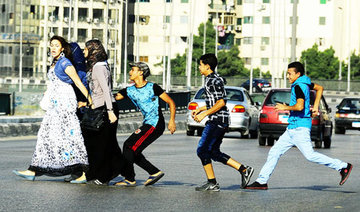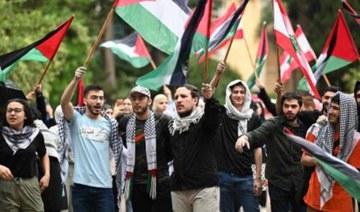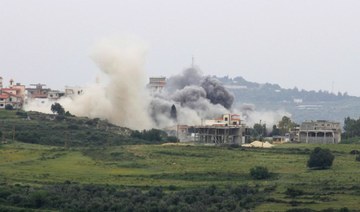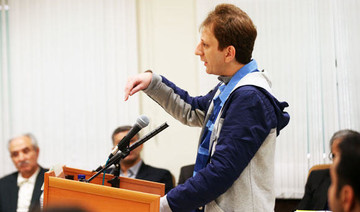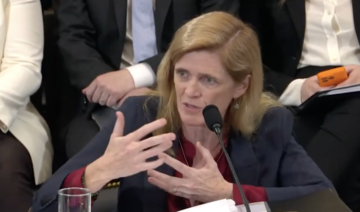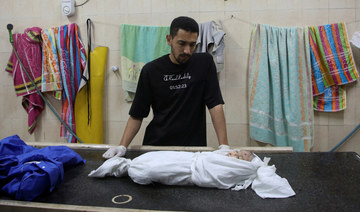CAIRO: Accusations of sexual misconduct directed at two prominent human rights lawyers in Egypt — one of them a former presidential hopeful — have roiled the country’s beleaguered civil society, which is already under unrelenting pressure from authorities.
The allegations, directed at former presidential hopeful Khaled Ali and another lawyer, were made in a private email sent by a woman in October that has since been widely shared on social media. Many have cast it as part of the global #MeToo campaign against sexual assault and misconduct, while accusing the activist community of closing ranks to avoid embarrassment.
The woman, currently living in Europe, has declined to give media interviews and has not filed a complaint with authorities. The Associated Press does not publicly identify victims of sexual assault and is not naming the second lawyer because no formal complaint has been made against him.
In the email, the woman alleged that Ali invited her to his downtown Cairo office in 2015 after other employees had gone home. The woman, who had recently quit her job at the rights organization founded and led by Ali, said he offered her a beer before he left to shower next door. When he came back, he asked her personal questions about two of her past relationships, she said.
“I finish the beer and tell him I need to leave because I have an appointment in the morning,” she recounted in the email. “He tries to convince me to stay over and that it’s getting late. I tell him no, I prefer to go,” she wrote. She said she left without further incident.
She said the other lawyer, who specializes in women’s rights, had suggested she spend the night at his place after an evening of heavy drinking at a downtown bar with friends in 2014. She said she took him up on the offer because she was drunk, and that he raped her that night.
She said she has been in therapy to deal with the trauma, and that her email was meant as a warning to women employed by rights groups. Two of her friends, who spoke on condition of anonymity to preserve her privacy, said she told them she decided to break her silence when she learned that Ali planned to run for president.
The lawyer denied the rape allegation in a phone interview with the AP, saying he had “consensual” sex with the woman. In the email, she acknowledged having consensual sex with him after the alleged rape.
Ali responded to the accusations leveled against himself in a Facebook post on Feb. 19, calling them “extremely shocking and surprising.” He said he had ordered his campaign and his Bread and Freedom party to investigate the allegations shortly after they surfaced and had refrained from commenting publicly until the investigation was complete.
The three-person panel of supporters cleared Ali of any wrongdoing but reprimanded him for mixing his personal life with his political work. The accuser questioned the panel’s objectivity and refused to cooperate with it.
“The mere thought that she entertains such thoughts about me and wrote an email reflecting them leaves me with no choice but to offer her an apology for the pain she suffered,” he wrote. “Although the findings of the investigation are in my favor, I must still take some of the blame.”
Ali resigned from his leadership of the party, as well as the rights group he founded. Several telephone calls and messages to Ali seeking comment went unanswered.
Supporters applauded his response, calling it a rare show of accountability in a conservative society where sexual harassment is rampant and sex crimes are rarely acknowledged or prosecuted.
Others say his campaign dodged the allegations while trying to get him on the ballot. Ali declared his intention to run for president in November but quit in January, citing intimidation by authorities. The panel released a summary of its findings after he abandoned his run.
President Abdel-Fattah El-Sisi is widely expected to win re-election in the March 26-28 vote after several potential candidates withdrew or were arrested. The only other candidate to make the ballot is a little-known politician who supports Sisi.
Egypt’s civil society, which played a key role in the 2011 uprising that toppled longtime autocrat Hosni Mubarak, has been the target of a sweeping crackdown since Sisi led the military overthrow of an elected Islamist president in 2013.
Several prominent activists have been arrested, while others have been banned from travel or had their assets frozen. Their organizations have been subject to draconian restrictions, and pro-government media routinely portray them as depraved agents of hostile foreign powers.
But critics within the rights community say none of that excuses the response to the allegations against Ali.
The “Girls’ Revolution,” a women’s rights group, issued a statement saying Ali’s supporters had not acted quickly enough.
“Although the leadership of the party was informed of the email in November, the campaign went on despite the suspected abuse,” it said.
More than 100 activists, including many women, signed a declaration saying the panel, which was appointed in December, “mirrored the state’s criminal justice system, complete with its deficiencies (and) lack of safety for those who complain.”
It said the handling of the case, like that of allegations against other public figures, was dominated by the “spirit of the clique” — a desire to shield prominent individuals from criticism and protect the international image of civil society groups, many of which received support from abroad before the latest crackdown.
Several prominent women’s rights activists declined to comment on the case.
But Mona Eltahawy, an Egyptian writer and activist based in New York, said the response from Ali’s supporters shows that “their revolution is not genuine because the essence of the things we are struggling against remain inside them.”
“The woman who wrote the email deserves much more justice than she has received so far,” she said.
Egypt’s embattled activists face a #MeToo reckoning
Egypt’s embattled activists face a #MeToo reckoning

UNICEF demands immediate ceasefire in southern Lebanon, protection of children
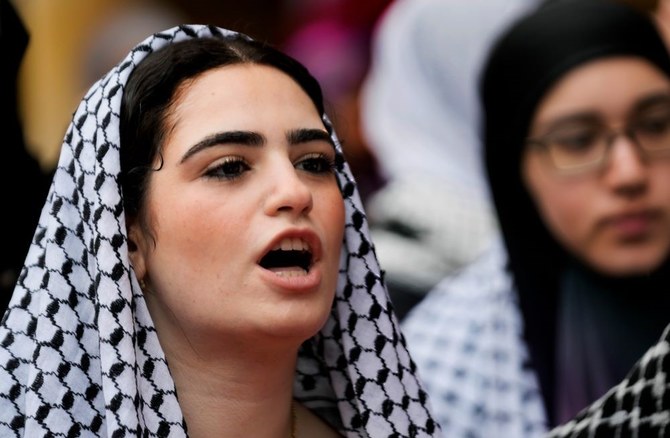
- Israeli airstrikes destroy houses, wounding individuals
- Students from the American University of Beirut and the Lebanese American University called on their administrations “to boycott companies and institutions supporting Israel”
BEIRUT: Lebanon’s Disaster Risk Management Unit announced that the total death toll from Israeli attacks since Oct. 8 has reached 438 people.
According to the latest report issued by the Lebanese Ministry of Health, eight children were among the dead and 75 children were among the 1,359 people injured since the escalation of hostilities.
The UN Children’s Fund expressed its concern over “the continuing hostilities in southern Lebanon that are taking a devastating toll on the population, forcing around 90,000 people, including 30,000 children, from their homes.”
UNICEF called for “an immediate ceasefire and the protection of children and civilians,” and indicated that “the increase in armed conflict has damaged infrastructure and civilian facilities, causing severe damage to basic services that children and families depend on, including nine water stations serving 100,000 people at least.
“More than 70 schools are currently closed, affecting around 20,000 students and significantly affecting their education. Around 23 healthcare facilities — serving 4,000 people — are closed due to the hostilities.”
UNICEF’s representative to Lebanon, Edouard Beigbeder, expressed the organization’s deep concern. “As the conflict impacting the south of Lebanon is in its seventh month, we are deeply alarmed by the situation of children and families who have been forced from their homes and the profound long-term impact the violence is taking on children’s safety, health, and access to education.
“As long as the situation remains unstable to this extent, more children will suffer,” Bigbeder warned. “Protection of children is an obligation under the International Humanitarian Law and every child deserves to be safe.”
In a statement, UNICEF indicated that before the outbreak of the conflict, basic services in Lebanon, including health and education systems, were in danger of collapsing after years of overwork. The unprecedented economic and financial crises that have hit the country since 2019 have exacerbated existing economic vulnerabilities.
Following the displacement of residents from the southern border region, UNICEF, in collaboration with its partners, has been providing “crucial aid to affected families seeking refuge in shelters. Emergency cash assistance, facilitated in partnership with the Ministry of Social Affairs, has been extended to meet the immediate needs of 85,000 individuals. Some displaced children have managed to resume their education in official schools, receiving essential supplies and transportation support.”
On Tuesday, hostilities persisted intermittently on the southern front between Hezbollah and the Israeli military.
An Israeli airstrike targeted a house along the Kafr Kila — Al-Adisa road, destroying it and causing severe damage to nearby properties and homes. Additional Israeli airstrikes struck homes and commercial establishments in the towns of Aita Al-Shaab, Yaroun, Jebbayn, the outskirts of Naqoura, Alma Al-Shaab, and Jabal Al-Labouneh.
In solidarity with Gaza and echoing student activism in US universities, Lebanese university students organized sit-ins on campus or nearby areas, brandishing Lebanese and Palestinian flags and demanding the liberation of Palestine and a cessation of attacks on southern Lebanon.
Students from the American University of Beirut and the Lebanese American University in Beirut called on their administrations “to boycott companies and institutions supporting Israel.”
Similar demonstrations unfolded in several private universities across Lebanon, including Beirut Arab University, Lebanese International University, Saint Joseph University, Haigazian University, and Holy Spirit University of Kaslik.
Iran commutes a tycoon’s death sentence to 20 years in prison
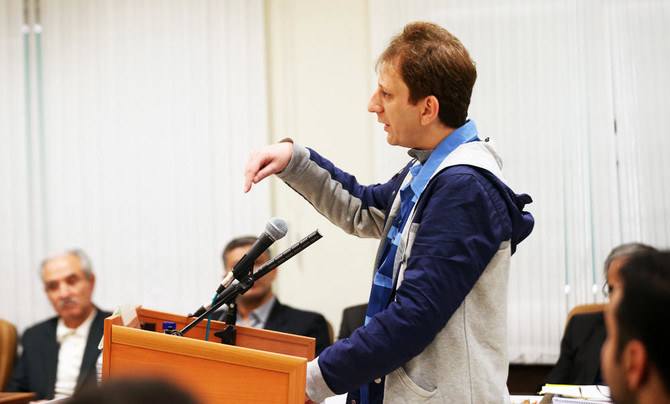
- Babak Zanjani was sentenced to death in 2016 over a number of charges
- An appeal for amnesty by Zanjani was reviewed and his death sentence was “commuted to a 20-year prison term
TEHRAN: Iran’s judiciary said Tuesday that it commuted a death sentence for a tycoon to 20 years in prison after he returned around $2.1 billion in assets from illegally selling oil abroad, the official IRNA news agency reported.
Babak Zanjani, 48, was sentenced to death in 2016 over a number of charges, including money laundering, forgery and fraud that disrupted the country’s economy.
IRNA quoted judiciary spokesman Asghar Jahangir as saying that an appeal for amnesty by Zanjani was reviewed and his death sentence was “commuted to a 20-year prison term after approval by the Supreme Leader.”
Ayatollah Ali Khamenei has the final say on all state matters and occasionally issues pardons.
Jahangir said as part of Zanjani’s 2016 sentence, he had the right to an amnesty or commutation of his death sentence if he returned the assets, compensated for damages and expressed regret for wrongdoing. The spokesman said that Zanjani cooperated with the judiciary to locate the assets abroad in recent years while he was in prison, and all the money was returned.
Zanjani was arrested in 2013 shortly after the election of then President Hassan Rouhani as part of a crackdown on alleged corruption during the rule of former President Mahmoud Ahmadinejad.
Authorities said then that Zanjani owed more than 2 billion euros ($2.1 billion) for oil sales he made on behalf of Ahmadinejad’s government. Zanjani was one of Iran’s wealthiest businessmen, with a fortune worth an estimated $14 billion.
The commutation of Zanjani’s sentence indicates that Iran’s government is in need of revenue after years of US sanctions on the country.
In 2018, then President Donald Trump pulled the US out of a nuclear deal with Iran that had aimed to lift sanctions on Iran in return for the capping of the country’s nuclear activities. Since then, Iran has found it difficult to sell its crude, the country’s main source of foreign revenue. After Trump’s unilateral withdrawal from the deal, Iran’s rial currency tumbled.
In 2014, Iran executed another billionaire businessman, Mahafarid Amir Khosravi, for a $2.6 billion state bank scam in Iran.
UN chief says ‘incremental progress’ toward averting Gaza famine
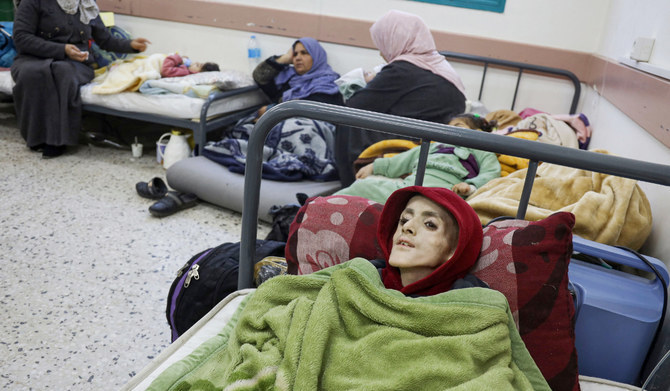
- Guterres said a major obstacle to distributing aid across Gaza is a lack of security for aid workers and civilians
UNITED NATIONS: United Nations Secretary-General Antonio Guterres on Tuesday said there has been “incremental progress” toward averting “an entirely preventable, human-made famine” in the northern Gaza Strip, but much more is urgently needed.
He specifically called on Israel to follow through on its promise to open “two crossing points between Israel and northern Gaza, so that aid can be brought into Gaza from Ashdod port and Jordan.”
Guterres also told reporters that a major obstacle to distributing aid across Gaza is a lack of security for aid workers and civilians.
“I again call on the Israeli authorities to allow and facilitate safe, rapid and unimpeded access for humanitarian aid and humanitarian workers, including UNRWA, throughout Gaza,” he said.
Houthis claim attacking US, Israeli ships
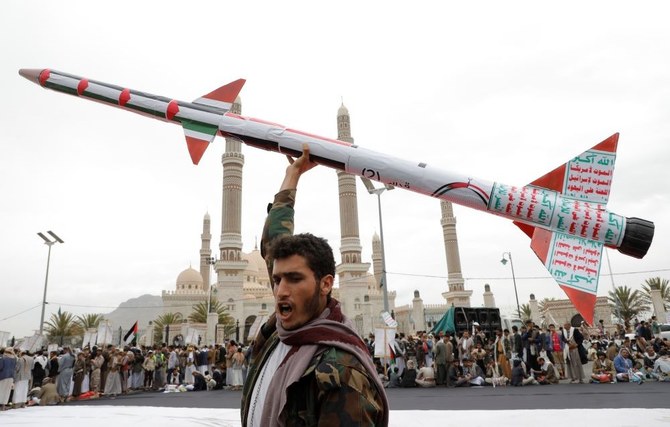
- Houthi military spokesperson Yahya Sarea said that their armed forces launched a number of explosive-laden drones at two US Navy warships in the Red Sea
- Militia also targeted the MSC Orion commercial ship with drones in the Indian Ocean
AL-MUKALLA: Yemen’s Houthi militia has claimed responsibility for four strikes on international commercial and navy ships in the Red Sea and Indian Ocean, including one on a ship destined for Oman.
Houthi military spokesperson Yahya Sarea said on Tuesday that their armed forces launched a number of explosive-laden drones at two US Navy warships in the Red Sea and targeted the MSC Orion commercial ship with drones in the Indian Ocean, which they claimed was related to Israel.
The MSC Orion is a container ship flying the Portuguese flag and traveling from Portugal’s Sines port to Oman’s Salalah port, according to websites that provide information on ship whereabouts and identities.
Oman is one of few nations to host Houthi officials, and its delegations have visited Houthi-controlled Sanaa to push for peace in Yemen.
The Houthis said they also targeted the Cyclades commercial ship for reaching the Israeli Eilat port on April 21, violating earlier instructions to ships in the Red Sea not to go to Israel.
Since November, more than 100 ships sailing in the Red Sea, Bab Al-Mandab Strait, and Gulf of Aden have been attacked by hundreds of drones and ballistic missiles fired by the Houthis in support of the Palestinian people against Israel’s bombardment of Gaza.
The Houthi assaults have prompted the US to organize an alliance of naval task forces and start airstrikes on Houthi-controlled areas of Yemen.
The US Central Command said in a statement that the Houthis fired on Monday three anti-ship ballistic missiles and three drones from areas under their control at the MV Cyclades, which it said is owned by Greece and sails under the flag of Malta, with no reported damage to the ship.
Also on Monday, US CENTCOM forces destroyed one airborne unmanned aerial vehicle launched by the Houthis against the US Navy ships USS Philippine Sea and USS Laboon in the Red Sea.
“There were no injuries or damages reported by US, coalition, or merchant vessels. It was determined the UAV presented an imminent threat to US, coalition, and merchant vessels in the region,” US CENTCOM said.
The EU military operation in the Red Sea, known as the Eunavfor Aspides Operation, said its Fasan frigate shot down one drone on Monday while guarding a commercial ship in the Red Sea from multiple attacks from Houthi-controlled regions of Yemen.
Rashad Al-Alimi, chairman of Yemen’s internationally recognized Presidential Leadership Council, accused the Houthis on Tuesday of not being serious about achieving peace in Yemen and of using the UN-brokered truce to regroup and prepare to restart the war.
In a meeting of Yemen’s military officials in the central city of Marib, Al-Alimi vowed that the Yemeni government would drive the Houthis from the areas under their control, including Sanaa, and thwart their attempts to restart the conflict.
“The Houthi militia has shown that it is not a genuine partner in peacemaking, but rather views peace talks as a kind of deceit and preparation for fresh conflicts,” Al-Alimi said, according to the official news agency SABA.
Hostilities in Yemen’s flashpoints have generally abated since April 2022, when the UN-brokered ceasefire went into effect. The Yemeni government, however, said that the Houthis continue to wage lethal assaults on its troops in Marib, Dhale, Taiz, and other locations, and to mobilize personnel and military equipment outside of contested towns.
Meanwhile, six Yemeni troops were killed and 11 injured on Monday after an improvised explosive device placed by Al-Qaeda militants blew up their vehicle in the Moudia district in the southern province of Abyan.
The targeted troops were members of a military unit allied to the pro-independence Southern Transitional Council, which has been fighting Al-Qaeda in Abyan and Shabwa for months.
Israeli offensive on Rafah is bad idea, French foreign minister tells PM Netanyahu

- “There are too many uncertainties over the humanitarian issues,” Stephane Sejourne told Netanyahu
JERUSALEM: An Israeli offensive in Rafah is a bad idea and would not resolve anything in the country’s fight against Hamas, France’s foreign minister told Israeli Prime Minister Benjamin Netanyahu on Tuesday, according to a French diplomatic source.
“It is a bad idea to do it. There are too many uncertainties over the humanitarian issues,” Stephane Sejourne told Netanyahu during a meeting at the prime minister’s office in Jerusalem, the source with direct knowledge of the conversation said.



